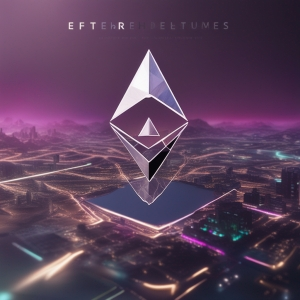Table of Contents:
Introduction: The Rise of DeFi and Ethereum's Role
Decentralized finance, popularly known as DeFi, is driving a seismic shift in the finance world, and Ethereum is at the helm. But what exactly is DeFi, and why is Ethereum leading the charge? This article will demystify these concepts and shed light on Ethereum's influential role in the burgeoning DeFi landscape.
Our exploration spans from DeFi's fundamentals, Ethereum's unique features, to the symbiotic relationship between the two. Whether you're a novice in the crypto scene or a seasoned enthusiast, this piece offers insightful takeaways about Ethereum and DeFi in easy-to-understand language. It's time to unearth the exciting story of Ethereum and DeFi, the game-changers rattling the traditional financial order.
Why Ethereum is Leading the DeFi Revolution
In the DeFi revolution, Ethereum has emerged as the linchpin due to its multifaceted advantages. Its native blockchain platform fosters an open, permissionless ecosystem, allowing developers to build and run smart contracts. These self-executing contracts enable the creation of sophisticated DeFi apps, known as Dapps.
This inherent flexibility and versatility of Ethereum make it a popular choice for DeFi applications. Also, Ethereum's transaction speed and security add to its appeal as the go-to platform within the DeFi landscape, facilitating fast, secure, and efficient operations.
Further, the Ethereum platform has a vibrant community of developers and enthusiasts, an invaluable resource that guarantees constant improvements, robust security measures and novel DeFi products and services. It's a tangible advantage that solidifies Ethereum's leadership position in the DeFi revolution.
Lastly, Ethereum's token, Ether, holds a pivotal role in the DeFi sector. Substantial amounts of Ether are locked in DeFi protocols, underscoring its value within the DeFi ecosystem and its role in driving the proliferation of DeFi.
Pro and Contra: Decentralized Finance (DeFi) led by Ethereum
| Pro | Contra |
|---|---|
| Eliminates intermediaries, offering full control to users | High risk due to lack of regulation and potential for smart contract bugs |
| Highly transparent with transactions being public | Scalability issues, leading to slow transaction times and high costs |
| Offers opportunities for high returns | High volatility and uncertain stability |
| Ethereum's smart contracts make transactions programmable | Relatively difficult to understand and use for the average person |
What Makes Ethereum Different?

Despite a plethora of blockchain platforms, Ethereum's unique attributes set it quite apart. Arguably the most compelling feature of Ethereum is its Turing-completeness. This means, unlike many of its rivals, Ethereum can run any program, as long as it has enough time and computing power. This unparalleled computational potential is what empowers the diverse range of DeFi applications on the Ethereum platform.
Furthermore, Ethereum's governance is also a point of distinction. It operates under a Proof-of-Stake consensus model, known as Ethereum 2.0 or simply 'Eth2'. This mechanism enhances Ethereum's scalability and energy efficiency, providing a sustainable backbone for DeFi's expanding universe.
Lastly, Ethereum is constantly evolving. The development roadmaps, such as 'Serenity', 'Metropolis' among others, showcase Ethereum's commitment towards continual innovation to meet the ever-evolving needs of the DeFi sphere. This ongoing adaptability is vital for catapulting DeFi applications to new heights and fortifying Ethereum's cardinal place in the DeFi revolution.
The Growing Adoption of Ethereum and DeFi
DeFi's potential to democratize finance is garnering significant attention. As a result, the adoption of Ethereum and DeFi is on a steady, promising rise. An increasing number of institutional investors and big-name brands are also jumping on the DeFi bandwagon.
Additionally, countries worldwide are recognizing cryptocurrencies' value, leading to better regulation and wider acceptance. With Ethereum being the primary platform for DeFi, this burgeoning acceptance augurs well for its continued growth.
Furthermore, the unmatched versatility of Ethereum's platform is enabling an ever-growing variety of DeFi applications. From decentralized exchanges (DEXs), lending and borrowing platforms, prediction markets, to yield farming and liquidity mining, Ethereum is powering the future of finance. Harnessing Ethereum's capabilities, these applications are revolutionizing how we interact with financial systems, thereby catalyzing DeFi's mass adoption.
Moreover, the tangibility of DeFi's benefits in terms of financial inclusivity, transparency, and freedom is also boosting Ethereum's credibility. As more individuals and businesses tap into these advantages, the usage of Ethereum and adoption of DeFi are set to accelerate even further.
Breaking Down DeFi: Understanding Ethereum's Financial Applications

Decentralized Finance, or DeFi, is a broad term, emphasizing the use of decentralized networks and open-source software to create different types of financial services and products. The birthplace for most DeFi applications, or dapps, remains Ethereum. Ethereum provides the vital infrastructure, enabling these dapps to function effectively and securely.
DeFi's primary applications on Ethereum include decentralized exchanges (DEXs), yield farming, lending platforms, and more. DEXs allow users to trade cryptocurrencies directly, eliminating intermediaries and offering heightened privacy. Yield farming, a novel DeFi strategy, provides users with returns on their cryptocurrency investments in the form of interest or additional tokens. Also in the mix, lending platforms enable loans without banks, using smart contracts to automatically match lenders and borrowers.
Moreover, prediction markets, insurance platforms and stablecoins, each with its unique purpose, contribute to this broadening DeFi ecosystem on Ethereum. Using Ethereum blockchain’s transparency and security, these applications revolutionize finance, offering solutions that are not just decentralized but also accessible, efficient and inclusive.
However, while these applications are transforming the financial landscape, they're not devoid of challenges. Issues such as scalability, interoperability and regulatory concerns need to be addressed. Yet, Ethereum's continuous evolution gives hope for better DeFi solutions.
Ethereum's symbiosis with DeFi is a match made in the crypto heaven. As DeFi continues to flourish, Ethereum’s adoption and influence will invariably grow, potentially creating a new financial order that’s inclusive, transparent and decentralized.
Real World Use Cases: Impacts of Ethereum and DeFi
Observing real-world use cases helps in understanding the tangible impacts of Ethereum and DeFi. Let's explore a few significant instances that have made a difference across various sectors.
One remarkable use case of Ethereum in DeFi is in peer-to-peer lending platforms. These platforms allow users to lend and borrow cryptocurrencies directly, without the need for a central authority. Traditional financial intermediaries like banks are bypassed, and users also have the chance to earn interest on their tokens. A good example of this would be platforms such as Aave and Compound.
Decentralized exchanges (DEXs), like Uniswap, are another powerful application empowered by Ethereum’s smart contracts, that have gripped the DeFi market. Here, traders can swap tokens directly with each other, without needing an intermediary. This not only makes the process more direct and faster, but also removes the possibility of censorship from a centralized authority.
In the insurance sector, Ethereum-backed DeFi platforms like Nexus Mutual have managed to draw attention. Utilizing Ethereum’s smart contract capabilities, these platforms enable users to share risks without needing an insurance company, thereby reducing costs and enhancing simplicity in processes.
Further, Ethereum's DeFi has made waves in the world of remittances. Transactions boundary barriers are shattered. Funds can be sent across the globe quickly, securely and at a cheaper rate than traditional remittance channels. This is a solution that exceptionally benefits developing countries, where remittances represent a significant part of their GDP.
Acknowledging these use cases affirms the pivotal role Ethereum plays in DeFi and its potential to reform various sectors.
The Future Prospects for Ethereum and DeFi

As we gaze into the future, the prospects for Ethereum and DeFi appear bright and enticing. With ongoing technological advancements and evolving market dynamics, this dynamism is set to intensify.
For Ethereum, the journey to its full transition to Ethereum 2.0 heralds exciting possibilities. The upgrade promises improved scalability, security, and sustainability, which could propel an even wider adoption of Ethereum and, consequently, DeFi applications. Ethereum’s sustained growth will undoubtedly further nourish the DeFi sector.
The increasing institutional interest in DeFi suggests a maturing market. With more established financial entities venturing into DeFi, more innovative financial products will arise, offering better yields and new investment opportunities. This will likely enhance the credibility and wider acceptance of DeFi.
On the regulatory side, while challenges persist, there's a growing acceptance worldwide. Regions like Europe are taking the lead with forward-thinking crypto regulations. As clearer regulatory guidelines are established, potential risks surrounding DeFi can be better addressed. Consequently, this paves the way for increased consumer protection and industry stability, nurturing a healthier DeFi ecosystem in the long run.
Finally, the rise of the concept of 'Web 3.0', an internet powered by blockchain technology, opens new avenues for DeFi. 'Web 3.0' could integrate DeFi services into corporate systems, social media platforms, and even government services, presenting a new era of financial management. As the primary driver of this realm, Ethereum stands ready to underpin this transformative shift, signifying a promising future for Ethereum and DeFi.
Conclusion: Reaping the Benefits of Ethereum and DeFi
In the rapidly evolving world of decentralized finance, Ethereum has firmly established itself as the cornerstone. As the principal domicile for DeFi applications, it is summoning a new era in finance, one that prioritizes accessibility, transparency, and user autonomy. For the everyday user, this translates into a democratized financial space where everyone can access and participate in a global money system without intermediaries.
Ethereum's technological prowess, embodied in its Turing-complete platform and continual evolutionary commitment, powers a broad repository of DeFi applications. The ingenuity of the Ethereum blockchain is enabling a reimagination of financial services, from trading and lending to insurance and savings, thus engendering unprecedented financial possibilities. While still in its early stages, the DeFi space has already showcased its vast potential, with Ethereum leading this financial renaissance.
Further fortifying its significance is Ethereum's indispensable token, Ether. Embedded in many DeFi protocols, its use not only underpins the functioning of DeFi applications but lends credence to Ethereum’s evolution as the DeFi powerhouse. As the world warms up to the idea of decentralized finance, the partnership between Ethereum and DeFi is anticipated to rise to higher pedestals, continuing to blur the lines between the traditional and the decentralized finance worlds.
In conclusion, while DeFi and Ethereum are not without their own set of challenges, the fusion of the strengths of the two is slowly but surely revolutionizing finance. The alliance of Ethereum and DeFi promises not just a seismic shift in finance but a closer realization of a global, open financial system. Thus, whether you're an investor looking to maximize returns or an enthusiast following the current trends in finance, Ethereum and DeFi are likely to be your key players.
Frequently Asked Questions: DeFi's Rise with Ethereum Leading the Way
What does DeFi mean?
DeFi stands for 'Decentralised Finance'. It represents the usage of blockchain, cryptocurrencies, smart contracts and other technologies to recreate and improve upon traditional financial systems.
Why is Ethereum leading the charge in DeFi?
Ethereum is leading the DeFi revolution due to its well-established platform, active community, and the ability for developers to create and launch their own applications on it.
What are the benefits of DeFi?
DeFi offers numerous benefits including open access to financial services, more efficient and less expensive systems, transparency, and interoperability.
What are the risks associated with DeFi?
DeFi also comes with risks such as smart contract failures, protocol changes, and exposure to volatile cryptocurrencies.
How can I get involved in DeFi?
You can get involved in DeFi by buying cryptocurrencies and engaging with DeFi applications. Always remember to do your own research and understand the risks involved.




